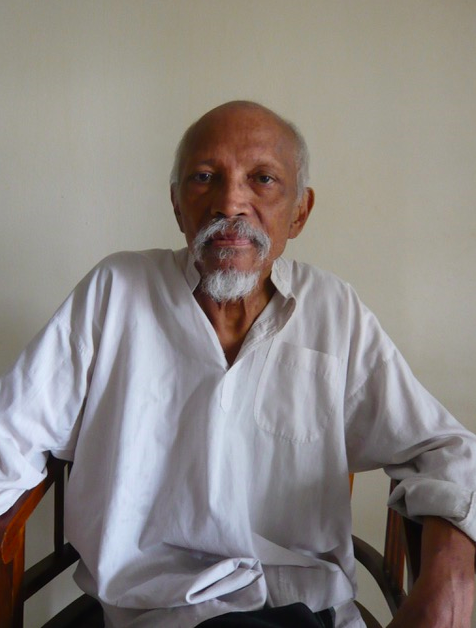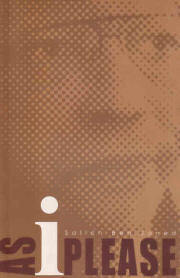
Salleh Ben Joned (Photo: Hawa Salleh)
.
Salleh Ben Joned: Malaysia’s Literary Icon
Salleh in his own words in ‘As I Please’
Writing a literary column in a country like Malaysia can be quite trying. The issues that matter keep recurring again and again, and when you want to be positive, to have the nice feeling of praising a writer or some writing for a change, there isn’t very much to shout about. Thus my self enforced soul searching, soul saving, khalwat from the column every month.
The word khalwat, incidentally, is of Arabic origin and it means “spiritual retreat.” In Malaysia, it has come to mean “retreat for immoral purposes” or sexual “close proximity,” a crime-sin which is punishable by the syariah law (it only applies to Malay-Muslims – so much for the special rights and privileges of the Malay-Bumis).
This obscene, nay, sacrilegious transformasi of the word khalwat is a perfect figure for the general perversion of values, of the spirit, intellect, heart, life and inevitably language – all in the name of an abstract piety (in this case, religion; in another, race). If I were asked what motivates my writings, I’d say simply: the crying need to say “No! In thunder!” to this perversion. No, in the name of Yes-to-life. Yes!
Salleh Ben Joned
Aldie, Virginia, U.S.A.
22 May 1994
.
Memorable lines
Selection drawn from articles featured in http://sallehbenjoned.blogspot.com
“Rojak is good for nation-building”.
“[I]f self-censorship is bad for the general intellectual development of a country, it’s worse for the development of its literature.”
“I wouldn’t be surprised if in the year 2020, we get a “writerly” (poststructuralist jargon, this) kritikus from one of our universities with perhaps a Ph.D. from the University of Buffalo, writing like this: …. What a wonderful way of bermastibasi (masturbation) and berbulshitasi (bullshit)! You’d need a Ph.D. from University Kerbau (Buffalo) to be able to do that.”
“I’ve always believed that being self-critical, both as an individual and as a nation, is a healthy thing, provided it’s not carried to extremes.”
“Poetry, like other forms of literature, can only perform its proper function in a state of creative freedom. There shouldn’t be any compulsion in poetry as there shouldn’t be in any religion. Given the transcendent unity of religions, what the jealous guardians of orthodoxy too readily call “apostasy” may only be the healthy exercise of that creative freedom sanctioned by God Himself.”
“The plain fact is we are a linguistically plural society with English as a very widely used second language among middle-class Malaysians. And the present widespread use of English will continue as long as we are exposed to information signals in English from overseas. There is not much that the Government can legitimately do about this essentially healthy exposure, as long as it remains wisely deaf to the demands of regressive elements in our society; those elements who would want it to resort to non-democratic methods to preserve the purity of the ‘national culture’. ”
“Now, with the slogan or motto Bahasa Jiwa Bangsa in mind, would any unblinkered Malaysian say that our “Malaysian soul,” however ill-defined and ambiguous it may be, can only be expressed in the National Language? A language belongs to those who speak it. It’s as simple as that. Given this fact, and that language communicates experience and is capable of transcending the boundaries of the culture of its origin – given all this, then the English we speak in Malaysia today belongs to us. It’s our English; along with BM it expresses our “soul,” with all its contradictions and confusions, as much as our social and material needs.”
.
About “As I Please”
 – 1994 introduction by Margaret Drabble, novelist, biographer and critic
– 1994 introduction by Margaret Drabble, novelist, biographer and critic
Anybody who wants to understand cultural politics today should read this book. Anybody who wants to understand Malaysia today should read this book. And anybody who wants an insight into confrontations of East and West, of Islam and the secular or Christian world, should read this book.
Salleh Ben Joned, poet and journalist, is an excellent guide through the minefields of misunderstanding that await the traveller at home or abroad. The articles and essays cover a wide range of issues, from the question of the National Language (and National Literature) of Malaysia to the death of Lorca, from the soporific dullness of hot Sunday afternoons in Kuala Lumpur to the Rushdie Affair, from erotic verse to the implications of the Fall of Granada in 1492.
Salleh is a joker and a satirist, and he can make one laugh aloud, but beneath the wit and invective is a courageous seriousness. Ridenten dicere verum quid vetat? As Horace said – or “Who says I can’t joke while telling the truth?” – Salleh’s jokes are often very near the bone, as are those of the best jesters, and he probably annoys his friends as often as his critics.
He writes in a political climate which is, to say the least, challenging. Malaysia should be grateful to him for communicating to outsiders so clearly and enjoyable its condition as it approaches the Millennium – though I suppose gratitude is what it always feels. After reading these essays, one has much more understanding of what is actually happening in a country whose relationship with Britain has recently been very vexed.
One can even pick up, from this volume, a few words of the language – it was Salleh himself in Kuala Lumpur who taught me the provenance of the word “amok”, and from these essays I have now learned that in Malay, breasts are tetek, a word which he lovingly describes as completely expressive of itself, and more evocative than any English version, literary or vulgar.
His translations of Malayan pantuns, sayings and terms of abuse also make one long to know of the language. It is clearly a fine tongue for invective.
Born in Malacca, Salleh had a Western education in Australia and Tasmania, and is now widely travelled, but he remains a Malaysian and a Muslim. He is uniquely well placed to explore what has recently become a dominant cultural conflict of our time. Like Rushdie, he has lived, day by day, and tried to make sense of it.
His responses are instant, off the cuff, sometimes hasty – and that is one of the virtues of this volume of occasional pieces. It has a great immediacy. The debate is with society, and he shows us a mind unable to censor itself. He explores the Quran and the Hadith, finding there mercy and compassion: he challenges the dictators of religious orthodoxy on their ground, pleading for a tolerance which he assures us has scriptural authority.
This is a brave agenda. The word “blasphemy” and “sacrilege” and apostasy understandably haunt him, and he says that his typewriter has a curious habit of producing the word “scared” instead of “sacred.” His courage in trying to interpret one side of his heritage to the other, and hence to us, is exhilarating.
Salleh is bilingual, and writes in English and Malay: he supports strongly the right to write (and teach and be taught) in English, but he also has a strong feeling for Malay. His games with words in both tongues reveal his knowledge of James Joyce, of whom he here writes with admiration – making, incidentally some interesting comparisons between Irish nationalism and Malaysian nationalism.
He is sensitive to the grey area where religion fades in which literature itself can be co-opted, abused and misinterpreted. He votes for multi-culturalism, but he also understands its dangers.
Exhilarating, too, is the infectious enthusiasm with which he writes about writing. His friends and heroes, ranging from the Australian poet and trickster James McAuley to Octavio Paz, Ibsen, Chairil Anwar (“the first and probably the only true bohemian and rebel the Malay literary world has produced”) and journalist and novelist Isako San, are celebrated with generosity.
Above all, he arouses our curiosity. He makes us want to understand. For this alone Malaysia should give him a few medals. Who would have thought I would find myself reading an article on a Bumi writer’s dilemma with such interest? Until I came across Salleh Ben Joned, I never even knew what a Bumi writer was. This book challenges us all to find out.
.
On his personality and work
Johan Jaafar
“Salleh will be remembered forever as one of the finest minds ever to grace the Malaysian literary scene”.
Lim Teck Ghee
“An authentic and iconoclastic figure whose spirit and words have left a special and indelible legacy for our younger generation”.
Kee Thuan Chye
“The true Malay, in touch with the original Malay spirit and love for life”.
Lat
“It’s like meeting Hang Jebat on his day off.”
Zan Azlee
“If there ever was a Malaysian Zack de la Rocha or Widji Thukul, then …it was Salleh Ben Joned”.
Writings
Poetry: “Sajak Sajak Saleh – Poems Sacred and Profane” and “Adam’s Dream”,
Play: “The Amok of Mat Solo”
Collections of Columns and Essays: “As I Please” and “Nothing is Sacred”
Notable translation
“Fables of Dawn”, selected poems
English translation of Malay poems by Latiff Mohidin
Film
Paper Tiger (1975) and Bintang Malam (1991) – actor
Amok (1995) – story
About him
Catch the two-part audio documentary, ‘Salleh Ben Joned – The Unlikely Malay’, by Anna Salleh for the Australian Broadcasting Corporation.
Audio is available for download or listening at these links:
Part 1 https://ab.co/3bI3UIi
Part 2 https://ab.co/3iifhco
Tributes
Video
https://www.astroawani.com/topic/salleh-ben-joned
Audio
https://bfm.my/podcast/the-bigger-picture/front-row/remembering-salleh-ben-joned
Online text
https://www.malaysiakini.com/news/548572
https://www.nst.com.my/news/nation/2020/10/636287/malaysian-literary-giant-salleh-ben-joned-dies
https://silverfishbooks.com/blogs/news-1/the-salleh-ben-joned-1941-2020-i-knew
https://solidaritas.my/sajak-sajak-bahasa-melayu-salleh-ben-joned-satu-reviu-yang-terlambat/
https://www.malaysianow.com/wacana/2020/11/03/belasungkawa-salleh-ben-joned/
Other Links
Blog:
http://sallehbenjoned.blogspot.com
Facebook:
https://www.facebook.com/sallehbenjoned
- Anna Salleh kindly assisted on this article
.